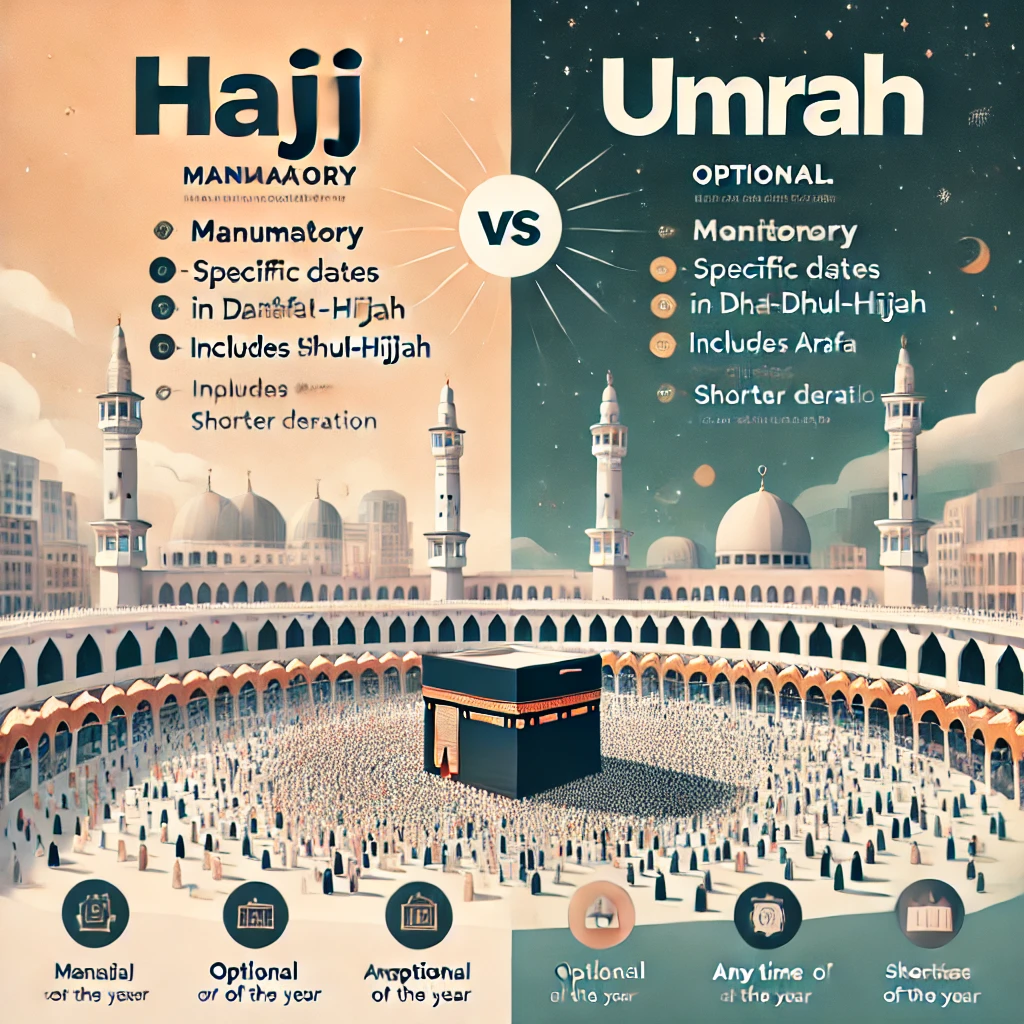
Hajj is an obligatory pilgrimage that every Muslim must perform at least once in their lifetime if they are physically and financially capable. It is one of the Five Pillars of Islam and occurs during specific dates in the Islamic month of Dhul-Hijjah. The pilgrimage involves a series of rituals that commemorate the actions of Prophet Ibrahim (AS) and his family.
Umrah, often referred to as the "lesser pilgrimage," is a non-mandatory pilgrimage that can be performed at any time of the year. Although it is not a pillar of Islam like Hajj, it is highly recommended and considered a significant act of worship. Many Muslims choose to perform Umrah multiple times throughout their lives.
| Feature | Hajj | Umrah |
|---|---|---|
| Obligation | Mandatory for all able-bodied Muslims | Optional but highly recommended |
| Timing | Specific dates during Dhul-Hijjah | Can be performed anytime except during Hajj |
| Duration | Typically lasts 5-6 days | Can be completed in a few hours |
| Rituals | Includes standing at Arafat, stoning the Jamarat, and animal sacrifice | Involves Tawaf (circumambulation) and Sa'i (walking between Safa and Marwah) |
| Complexity | More complex with additional rituals | Simpler with fewer rituals |
| Cost | Generally more expensive | Typically less expensive |
Hajj: As one of the Five Pillars of Islam, Hajj is obligatory for every Muslim who meets certain conditions (financially and physically capable). It must be performed at least once in a lifetime.
Umrah: While Umrah is highly recommended and carries great spiritual rewards, it is not obligatory. Muslims can choose to perform it whenever they wish.
Hajj: The pilgrimage occurs during specific days from the 8th to the 13th of Dhul-Hijjah. This limited timeframe makes planning essential.
Umrah: Unlike Hajj, Umrah can be performed at any time throughout the year, except during the days of Hajj.
Hajj: The rituals of Hajj span several days, typically lasting around 5-6 days. This extended duration allows pilgrims to complete all required rituals.
Umrah: This pilgrimage can be completed relatively quickly, often within a few hours, making it more accessible for those with time constraints.
Hajj Rituals: The pilgrimage includes several critical rituals:
Umrah Rituals: The rituals are simpler:
Hajj: Due to its mandatory nature and extensive rituals, Hajj is more complex than Umrah. Pilgrims must follow a strict schedule and adhere to specific guidelines.
Umrah: The simplicity of Umrah allows for flexibility in timing and execution, making it easier for many Muslims to undertake.
Hajj: Generally more expensive due to its longer duration, additional rituals, and higher demand during specific dates.
Umrah: Typically less costly as it requires fewer days and less complex arrangements.
Both Hajj and Umrah are vital components of Islamic faith that offer unique opportunities for spiritual growth and connection with Allah. While Hajj is a mandatory pilgrimage with specific requirements, Umrah provides flexibility for personal worship at any time. Understanding these differences helps Muslims make informed decisions about their spiritual journeys.
At All India Haj Umrah, we are dedicated to facilitating your journey for both Hajj and Umrah. Our comprehensive packages cater to various needs and budgets, ensuring you have a fulfilling experience while performing these sacred rites. For more information on our offerings or to book your pilgrimage, visit us at www.allindiahajjumrah.com.
Whether you choose to embark on Hajj or perform Umrah, both paths lead to profound spiritual enrichment and closeness to Allah. Let us help you make your journey memorable!